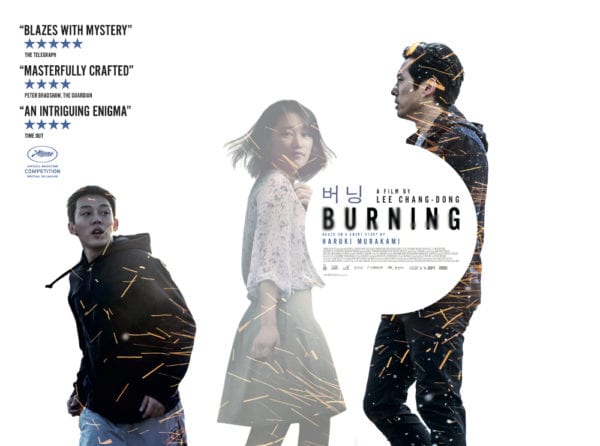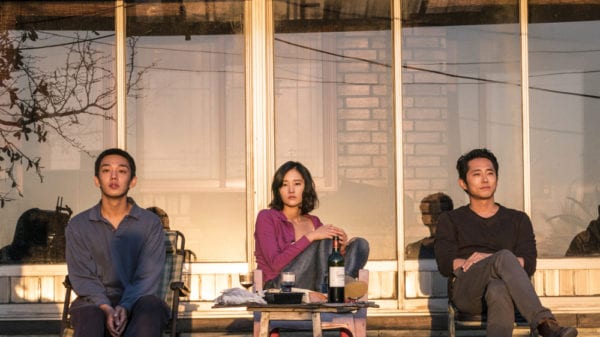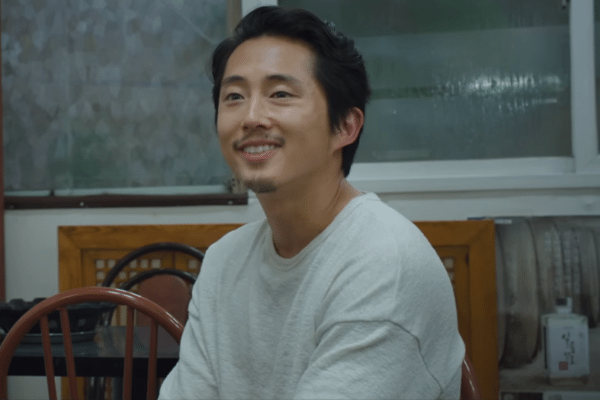Tom Jolliffe looks back at the 2018 Korean thriller Burning, a film brimming with ambiguity…

So it’s Christmas. I enter a well known entertainment store to peruse Blu-rays, particularly with an eye on collectors editions and specialist labels. It’s my first trip A.V. (that’s After Viddy). I’ve been working hard, balancing four jobs and a toddler. I fancied a treat and I got it. Among an old classic in Marathon Man and opting for The Long Goodbye (a film I criminally haven’t got round to seeing yet), I also bought a nice edition of The Hidden (a brilliantly shlocky body swapping cult action horror from Jack Sholder). Then I spent ages mulling over a final purchase. I pondered Klute on Criterion, but I’d only recently re-watched it (though undoubtedly I will plump for that soon enough). Finally I found myself perusing the World Cinema aisle. Something caught my eye…Burning.
Lee Chang-dong wasn’t unfamiliar to me. I loved Peppermint Candy, one of his earlier works. He’s one of Korean cinemas most gifted and acclaimed film-makers. Burning likewise wasn’t unfamiliar. I’d heard of it, I’d even added it to my watchlist on Amazon, not quite getting round to renting it. I’d heard it was good. It had caught attention and was the world breaking Korean film of 2018. It travelled well, but of course not nearly as well as Parasite the following year. That aside, I didn’t have much idea about the story, and besides some acclaim, not a huge knowledge on exactly how well received it was. I took the plunge and (somewhat) blind bought it.
Spoilers follow…(if you haven’t seen it, to get to the point, it’s a must watch, so depart now and return post viewing)

A day later I sat down to watch it with the good lady. I’d recently been introducing her to the delights of Bong Joon-Ho and so she was game for some more Korean cinema. What followed was a slow burning film with a distinct three part structure. The first sees two childhood friends (though perhaps, neighbours might be more apt) who reconnect. Jong-soo (Ah-in Yoo) and Hae-mi (Jong-seo Jun) reacquaint themselves. Jong-soo is a poor man from a rural upbringing, still intrinsically tied to his old family farm, with his father facing charges for assault. At the same time he works part time in the city, which is where he reconnects with Hae-mi (who after plastic surgery looks different). After quickly turning up the heat and having a booty call, Hae-mi is off to travel in Africa, but she asks Jong-soo to look after her cat. He agrees and does so (but never actually sees Boil the cat). When she returns we hit the next phase…Ben (Steven Yeun) is with Hae-mi and the film parlays into a vague love triangle. Like so much in Burning, it’s ambiguous. The relationship between Hae-mi and Ben isn’t overtly clarified, and Jong-soo’s feelings about her seem to increasingly grow in her absence and jump again after Ben arrives. Despite his jealously, he’s somewhat compelled by Ben (who in turn seems to take interest in Jong-soo as an aspiring writer).
By this point the film is engrossing, without breaking out of its lingering pace. The performances intrigue, the ambiguity doesn’t come to a point of frustration. Then there are a few little nuggets laid out suggesting something is impending. If you’ve seen L’Avventura, it has some similar elements, particularly in its ambiguity and how it deals with the disappearance. In Burning Hae-mi disappears. Unlike L’Avventura, which begins with a half hearted search that fizzles out to an unresolved end (after it becomes a guilt ridden love story), Burning builds the search. Jong-soo becomes increasingly determined to uncover where Hae-mi is, and grows more suspect that Ben was behind it. Chang-dong lays out plenty of clues, but he teases with the notion of perspective, and he regularly lays out a contradictory clue. He plays with the literal and the metaphorical too. Some things may mean something, others may not. We get an insight into Jong-soo as a person, and with his background and his past (his relationship with fire/burning certainly infects his outcome). We get insight into Hae-mi (whose insecurities and personal issues may or may not bare relevance to her outcome). There’s more than enough to suggest she’s troubled, that she may have cut and run, maybe killed herself, or there’s the darker possibility, that Ben killed her (And a further possibility that he got her to that point and tipped her psychologically over the edge).

Ben is the most deliberately ambiguous character. There’s certainly a look into class divide in the film and the mutual fascination between classes. The lower class begrudgingly admiring the affluence and lifestyle of the rich, the rich fascinated by the character of the down trodden lower classes. We sense Ben treats them as curios. He has his affluent friends who are all similar aesthetically, but is oddly drawn to someone like Jong-soo, but particularly so to lower class (and especially) troubled women. As he admits to Jong-soo, he has a particular hobby. He burns down decaying and unwanted greenhouses. The metaphor could evidently of course suggest certain women (of which Hae-mi would fit the metaphor). Less likely is that it’s a literal admission. The further possibility may be that it’s hot air. Something deliberately vague and suggestive to sound interesting. A lot points to Ben being potentially a sociopathic serial killer, but at the same time Chang-dong is non-committal. Perhaps certain moments are coincidental or circumstantial. Indeed, as Jong-soo continues his investigation (which begins with him taking Ben literally at his word and scouring the local vicinity for signs of burnt down greenhouses), we’re seeing it through the eyes of someone progressively losing control and objectivity. Jong-soo, who never saw Hae-mi’s cat Boil whilst feeding it, is convinced Ben’s new (post Hae-mi disappearance) cat is Boil (and additionally, a drawer seemingly full of feminine mementos in Ben’s bathroom, including Hae-mi’s pink watch). By the finale, Jong-soo has lost control and the final sequence takes the breath away, before the film ends with no resolution to Hae-mi’s story.
When the film ended I’d been engrossed into this story, which slowly turned into a blinkered detective story. It’s supremely acted by the three leads. The ambiguity is a constant challenge, and the script is impeccably strung together. That ending left me stunned and initially, like many, somewhat frustrated. My wife’s response after the film ended… ‘what was that rubbish???’ The following morning she followed up, ‘I didn’t sleep much last night, thinking about that film.’ Many a YouTube and internet commentator mirrored those feelings. My frustrations eased away, replaced by a feeling of slight awe. This is a film to be picked at, analysed and decoded to find the answer. The beauty of a film like Burning too, is that my answer could differ from yours, and I’ve looked over several theories that are wildly different, but many of which have enough foundation within the film to have a grounded logic.
I’ve stepped out of films I enjoyed at the cinema and forgotten most of it by the carpark. Almost a week later and Burning is burned into my brain. Like it slowly allured me into its story, it has slowly sunk in its claws and not let me go, and like a good Kimchi, it tastes better the longer it’s left to linger. It’s a purchase well made, a film to be re-watched and reconsidered. Nothing within it seems like filler. Every line, look, moment, seems important, even by virtue that it could be decidedly unimportant (those ambiguous contradictions and metaphors do play with the idea of being key, or being nothing). Like so much of the great Korean cinema of the last decade too, this feels inherently brave in its approach, like something daring to be scorned, willing us to switch away at the languid pace or bemoan the frustration of its unresolved ending. It’s bold in a way that Korean cinema seems more commonly intent on being, perhaps compared to Western film. I think I love it, but ask me again in 10 years.
What are your thoughts on Burning? Let us know on our social channels @flickeringmyth…
Tom Jolliffe is an award winning screenwriter and passionate cinephile. He has a number of films out on DVD/VOD around the world and several releases due out in 2021, including, Renegades (Lee Majors, Danny Trejo, Michael Pare, Tiny Lister, Ian Ogilvy and Billy Murray), Crackdown, When Darkness Falls and War of The Worlds: The Attack (Vincent Regan). Find more info at the best personal site you’ll ever see here.












